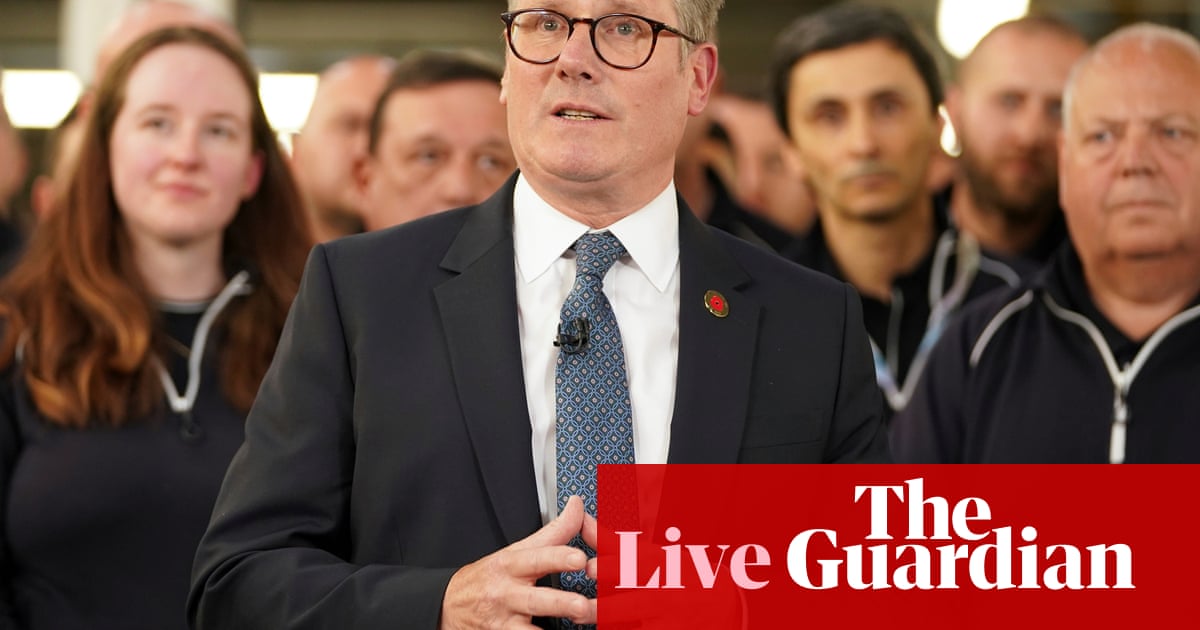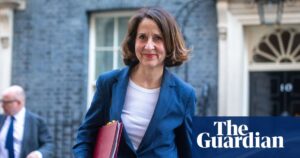
There is ongoing coverage on our US live blog.
For a full list of all the stories covered here today, scroll through the key events timeline at the top of the blog.
Labour chair of the Commons business committee
At first blush, it looks like the UK has stolen first-mover advantage and delivered the big win-win in #TrumpTariffTalks – complete with long-term guarantees.
A modest retreat on agriculture has unlocked a major reprieve for tens of thousands of jobs in the UK’s car and steel industries, in a deal that does not compromise our ability to pursue a big, bold reset with the European Union on 19 May. The transatlantic alliance has been strengthened— and not at the expense of our cross-Channel possibilities.
There is one major disadvantage, the 10% general tariff remains – but its removal was always a long shot with this administration.
From John Denton, secretary general of the International Chamber of Commerce, a global business organisation
Today’s agreement is a welcome signal that the US administration is serious about engaging with its trade partners and striking new deals.
While the deal offers some strategically important relief for British manufacturers, the reality is that U.S. tariffs on UK exports remain significantly higher than they were at the start of the year. It also remains unclear how this agreement will sit alongside any future sector-specific tariffs – in areas such as pharmaceuticals – which risks clouding long-term confidence in transatlantic trade relations.
More broadly, today’s deal seems to confirm that – even with a series of bilateral agreements – the world economy is facing the steepest rise in U.S. tariff levels since the 1930s. This remains, to be clear, a significant downside risk to business investment and global growth.
From Marley Morris, a trade specialist at the IPPR, a left-leaning thinktank
Today’s deal is the second big win for UK trade this week. The government managed to negotiate lower tariffs on steel and cars exported to the US, while maintaining clear red lines on food standards.
Contrary to expectations, there was also no change to the UK’s digital services tax. Instead, the government compromised by agreeing tariff reductions on items like beef and ethanol.
The deal does not remove Trump’s 10% universal tariff, but this was always unlikely. In an exceptionally unpredictable global trading environment, the government has played its hand well.
From Prof Emily Jones, a trade specialist at Oxford University’s Blavatnik School of Government
This deal looks like a skilful piece of negotiation from Keir Starmer and his team.
While we are still worse off overall than we were a year ago, and subject to 10% tariffs in most areas, the sky-high tariffs applied to the steel and car industry have been reduced.
In return the UK seems to have made some modest concessions, including opening up its market to some more beef and ethanol.
The UK has done well to keep further tax breaks for US tech giants off the table but there is a big question mark over whether this and other concessions will be part of the future technology partnership.
Helena Horton is a Guardian environment reporter.
Tom Bradshaw, president of the National Farmers’ Union, told the Guardian he is concerned the beef imported from the US will be produced to a lower standard than the UK product. He said:
80% of our beef diet comes from grass so it’ll be interesting to see exactly what the standards for the imported beef is. We are unclear on that as the details are still being worked on.
Many beef cattle are fed with soy, which can be bad for the environment as it comes from sensitive areas including the Amazon rainforest.
Bradshaw said the “main focus” in their recent lobbying was on hormone-treated beef, but said “the large US beef lots were also a big concern for our members – we will be watching that very closely.”
The US has vast factory farms for its beef, which outcompete those in the UK, farmers fear. Bradshaw added:
What we need to look at is how the US beef is produced, what are the health and welfare standards and what is the diet. Our beef is one of the most sustainable in the world.
However, he said he was pleased the UK secured reciprocal access to the beef market, adding:
We’ve had a very clear ask that we wanted reciprocal access back, and the red lines on animal health and welfare standards have thankfully been maintained. We cannot see agriculture used as a pawn to shoulder the burden of tariffs.
US Agriculture secretary Brooke Rollins said she hopes to expand today’s agreement to include “all meats” and that she will be visiting the UK next week to make this point, adding: “There is no industry that has been treated more unfairly than our agriculture industry.”
Bradshaw replied “good luck with that,” adding: “The government is trying to negotiate with the EU at the same time so that sounds unfeasible.”
In the Commons Andrew Griffith, the shadow business secretary, responded to Douglas Alexander on behalf of the Conservative party. He was also critical of the US-UK trade deal, although his language was more parliamentary than Kemi Badenoch’s. (See 5.03pm.) He said the deal did not go far enough.
If I’ve understood the minister correctly, we’re still not back to the position as it was at the beginning of February.
British goods will still be more expensive in the US than they were before. For all the special relationship, that puts us in the same category of countries as Burundi and Bhutan.
And more than what’s in this deal today is what is not. From the little the government has shared, it’s clear that the deal doesn’t go anything like far enough. It’s a Diet Coke deal, not the real thing.
9.23am). Ed Davey, the Lib Dem leader, said:
When it comes to any trade deal – and especially one with someone as unreliable as Donald Trump – the devil will be in the detail. One thing is clear, Trump’s trade tariffs are still hitting key British industries, threatening the livelihoods of people across the UK.
The government must now publish the full details of this deal and give MPs a vote. It would show complete disrespect to the public if this deal was waved through without giving parliament a say.
Under the arrangements that determine how parliament approves treaties, there is no guarantee that MPs get a vote on trade deals. In the US and the EU, Congress and the European Parliament do vote on trade deals.
these messages about the US-UK trade deal.
Today is an incredible day for America as we deliver our first Fair, Open, and Reciprocal Trade Deal — Something our past Presidents never cared about. Together with our strong Ally, the United Kingdom, we have reached the first, historic Trade Deal since Liberation Day. As part of this Deal, America will raise $6 BILLION DOLLARS in External Revenue from 10% Tariffs, $5 BILLION DOLLARS in new Export Opportunities for our Great Ranchers, Farmers, and Producers, and enhance the National Security of both the U.S. and the UK through the creation of an Aluminum and Steel Trading Zone, and a secure Pharmaceutical Supply Chain. This Deal shows that if you respect America, and bring serious proposals to the table, America is OPEN FOR BUSINESS. Many more to come — STAY TUNED!
Based on these figures, Badenoch said in a statement:
When Labour negotiates, Britain loses.
We cut our tariffs — America tripled theirs.
Keir Starmer called this ‘historic.’ It’s not historic, we’ve just been shafted!
In fact, the UK was shafted in early April, when President Trump announced his global tariffs. Today’s outcome amounts to a partial unshafting – but not a total one, as Keir Starmer sort of accepted during his Q&A. (See 4.33pm).
When Trump announced his global tariffs, the Tories issued a news release saying this was “disappointing news”. But they criticised Labour for not negotiating exemptions, and they said Britain was getting a Brexit bonus because its tariffs were lower than the EU’s (a situation that lasted only a week, because Trump subsequently suspended the additional tariffs that applied to the EU).
news release about the US-UK trade deal.
And here is the White House’s fact sheet about it.
Q: Were you bounced into this today? You did not seem to be expecting it today?
Starmer says he did not know the exact day this would be announced. If he had planned it, he would not have had his final phone call on the deal with Trump halfway through the second half of the Arsenal match last night, he jokes.
(Starmer is a huge Arsenal fan. So this was a new revelation about the sacrifices he has had to make in the national interest.)
Source: theguardian.com


















